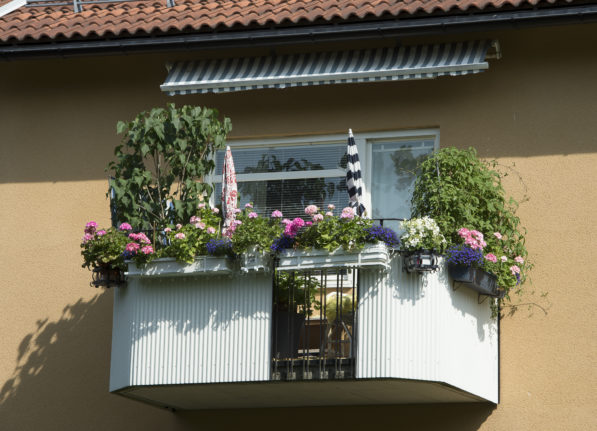“You should look at your rental contract to see if there are any special rules in regards to what you can and cannot do on a balcony”, Henric Gartz, lawyer at Fastighetsjuristerna Göteborg, a legal firm specialising in housing issues, told The Local.
“If nothing is specified, then you should follow the general rules and be considerate towards your neighbours.”
The three common issues that arise during the summer when Swedes take to their balconies are grilling, smoking and nudity, he said.
Barbecues
The summer season is perfect for grilling, and although many residential areas in Sweden have communal grills in the garden, this is not always the case. Even if they do, some people prefer grilling on their balcony to be closer to the kitchen.
“If you grill, it will smell of meat, fish or vegetables and it could smell bad for a neighbour”, said Gartz.
It’s also important to check with your housing association or your landlord to make sure they allow grilling on the balcony before you get started.
“A housing association has a lot of freedom to choose whether barbecues are allowed or not,” Maria Mati, property lawyer at HSB, Sweden’s largest cooperative housing association, wrote on HSB’s website.
“Therefore, you need to check to find out what applies in your association. But even if it’s allowed, you need to make sure that you grill in a fire-safe way.”
“And respect your neighbours,” she added.
Smoking
So, is it legal to smoke a cigarette outside on your balcony?
“You are allowed to smoke on your balcony,” Gartz said, “But if neighbours don’t like the smell of cigarette or cigar smoke, then be considerate.”
According to HSB, there’s no general ban on smoking in apartment blocks, and a housing foundation can’t ban you from smoking on your balcony or outside space.
“But you should also make sure you show consideration here,” Mati said, warning that you could end up on the wrong side of the law.
“The Residential Tenancies Act’s rules on disturbances in the property, or the Environmental Code’s rules on nuisance could be used in cases involving tobacco smoke,” she said.
“However, in one case, the district court in Falun decided that smoking on a balcony was permitted to a reasonable extent, even if irritated the neighbours,” she said.
Again, it all boils down to showing consideration for your neighbours.
“Maybe if you see that they are drinking coffee and you know smoke annoys them, wait until they finish before smoking”, Gartz said.
Can I have plants on my balcony?
Flower boxes are a great way to liven up a balcony or even try your hand at growing vegetables during the summer months – just make sure they’re hanging on the inside of your balcony so they can’t fall down and injure someone, and try to avoid water and soil raining down on your neighbours below when you water your plants.
Is it legal to sunbathe naked on my balcony?
It depends how you do it.
Stripping off on your balcony isn’t necessarily forbidden. However, you do need to consider whether the neighbours might see more than they want to while you’re catching some rays.
As is generally the case with rules for what you can and can’t do on your balcony, the law says that you’re more than entitled to take off your clothes in your own private space – but this shouldn’t impact your neighbours.
To get around this, you may want to put up a screen between you and your neighbour’s balcony (you may have to ask permission from your housing foundation if this involves drilling any holes in the wall), or even go full Adam and Eve with a strategically placed plant or two.
Another option is position your parasol so it blocks your neighbour’s view – just watch out for any gusts of wind that may strike at an inopportune moment.
If, however, people see you from the street this could be more problematic, and in some cases end up in court depending on the situation.
Similarly, you can’t have sex on your balcony where others could see or hear you – this could lead to a police report for förargelseväckande beteende (disorderly conduct).
In a nutshell:
Apartment living is often about compromise, and this also applies to what you do on your balcony. Speak to your neighbours and make sure they’re not irritated by your behaviour – similarly, let them know if something they’re doing is irritating you and see if you can figure out a solution which works for everyone.
“It is important to respect each other and talk about issues, if you live close to other people”, Gartz said.






 Please whitelist us to continue reading.
Please whitelist us to continue reading.
Member comments